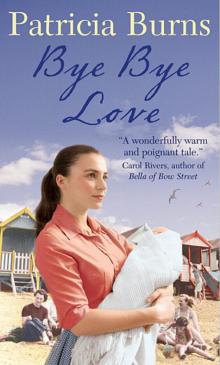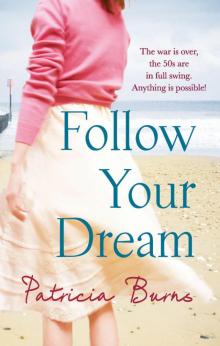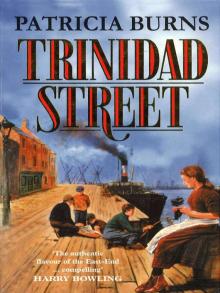- Home
- Patricia Burns
Trinidad Street Page 2
Trinidad Street Read online
Page 2
‘Fair? What’s fair? Me wearing my eyes out mending for you? And you can take that look off of your face, my lad. Any more trouble from you and your dad’ll have something to say when he comes in. When you’ve finished that tea you can go and fetch some more coal in for me.’
Scowling, Jack obeyed. He picked up the bucket and disappeared out into the yard. The back door slammed behind him in protest.
‘I’m a good girl,’ Daisy said self-righteously. ‘I got a merit mark today, I did.’
‘Did you, lovey? What for?’
Ellen sipped the scalding tea as Daisy chattered on. The warmth of the room seeped into her, making the chilblains on her fingers itch. On the range a pot bubbled, sending a delicious smell of stew into the room. It was mostly vegetables and barley by now, with just a trace of Wednesday’s neck of lamb, but it made her stomach lurch and growl. Home, familiar and secure, enfolded her. Resting her chin on her hands, she went over the morning’s momentous events again. Miss Evans calling her out in front of all the class, sending her to see Mr Abbot. The shame and the fear, wondering what she had done, wondering what crime she had committed. The walk down the brown-tiled corridor to his office was the longest she had ever taken. Then standing outside the door, plucking up courage to knock, wondering whether to make a run for it, where she could go all day until home time. She dreaded the smart of his withering tongue, so much worse than the sting of the cane. And then the amazement when she finally went in and saw he was smiling. Smiling! Mr Abbot!
‘. . . Ellen?’
She came back to the present with a start. Mum was looking at her, iron in hand.
‘Wake up, girl, do. Light the candle, I can hardly see.’
The room took on a homely glow, the feeble light heightening the cosiness, hiding the cheapness of the few possessions, the lack of colour, the damp patches.
Jack banged back in with the coal bucket, making the candle gutter in the draught.
‘Anyway,’ he declared, thumping it down beside the range, ‘Ellen got sent to Mr Abbot today, so there.’
‘You never?’ Mum stopped folding up a shirt and stared at her. ‘What you bin and gone and done?’
It was out. Ellen did not know whether to be relieved that the subject was in the open or angry that Jack had pushed her into it.
‘Nothing bad, Mum, honest!’ she said, gazing back earnestly at the accusing eyes.
‘I should hope not. You may be a dreamer but at least you never get into any trouble at school. What did he want?’
‘It was about this exam, Mum, this test. Mr Abbot said . . .’ Ellen took a deep breath, spoke more slowly, considering each word as it came out. ‘He said you can take this exam when you’re eleven, and if you pass it, you can go to Millwall Central. And he said he was sure I could pass it, and then he would be pleased to rec-recommend me. But you got to agree to it first, you and Dad.’
‘Millwall Central?’
The way the mother said it, she might have been saying Buckingham Palace. The dream receded, became hazy and distant, a castle in the clouds.
‘Yes.’
‘Cor, posh,’ Jack commented.
Ellen waited, heart thudding, for the verdict. The silence seemed to stretch to hours, years. Her mother was frowning, iron cooling slowly in her hand as she put her thoughts in order.
‘Don’t that mean staying on till you’re sixteen?’
‘Yes,’ Ellen admitted.
Again she thought of Harry leaving the day he was fourteen, like everyone else, going straight out to work. To stay on at school another two years seemed gloriously, impossibly selfish. School work she could do, she was good at. She was no good at drawing or sewing; people never picked her for their teams – she dropped balls and was last in races – but reading, writing, sums and learning by heart came easily to her. To be allowed two further years of it was a priceless gift.
‘Blimey.’ Mum’s voice was sharp. ‘You must think we’re made of money.’
A lurch of disappointment hit her in the stomach. They couldn’t afford it.
So that was that. No money. And yet she could not give it up just like that. She opened her mouth to plead, good reasons for staying on crowding her mind: the honour, making them and Mr Abbot proud of her, and more importantly the better job she would be able to get at sixteen.
But before she could get so much as a word out there was a thumping at the front door, uneven, desperate, and the words died on her tongue.
‘Martha – Martha!’
The street door handle rattled.
For a second all four froze. Then Mum moved across the room, surprisingly fast for such a large woman, negotiated the semi-darkness of the parlour with practised ease and opened the door. The three children sat motionless in the kitchen, listening.
‘Martha, thank God . . .’ The words were blurred with tears.
‘All right, Milly, all right, come in now, that’s it.’
They all knew the voice. It was Harry’s mother. They could all guess why she was here. Jack’s face took on a ghoulish interest.
‘What’s he done to her this time?’ he hissed.
Ellen felt queasy.
Mum came back into the kitchen, manoeuvring with difficulty through the door. She was supporting a thin woman who sagged inside her encircling arm, her breath rasping in great sobs. Ellen could not help staring. Milly Turner’s hair was half loose and straggling down. One eye was closed and swollen, blood poured from a cut on her lip and splattered the front of her soiled apron. She sank into the chair that Mum pulled out for her and doubled over, arms clutched round her stomach, groaning.
Over her head, Mum fixed the three pairs of wide eyes with a warning look and indicated the door with a thrust of the chin that said Out more plainly than words. Silently, they obeyed, Ellen swiftly, pulling Daisy and trying not to look at the abject woman, the dark welling blood. Jack followed reluctantly, dragging his gaze with difficulty from the fascinating sight.
The footballers were gathered in a bunch round the door, a dozen boys aged from eight to twelve or so, all bursting with interest, eager for the next stage of the entertainment.
‘What’s he done?’ one demanded.
‘Is she bad?’
‘What’s your mum said?’
‘She’s real bad, all blood.’ Jack mimed Milly’s posture, exaggerated her groans, working it up into a real performance. ‘Oh God, oh help me, I’m dying.’
The boys shrieked with glee.
‘She never!’
‘Go on!’
‘She did, she did. Bleeding all over the place, all down her front, all over the floor. Moaning and groaning. I think she’s dying. I think he’s killed her this time. Aaagh – aagh –’
Ellen could not bear it. She rushed at him, pushing him, beating him with her fists. Her brother laughed and dodged. The other boys danced around, imitating her in squeaky voices.
‘Stop it, stop it, you’re horrible!’
Jack leaned over and groaned one more time, then ran off up the darkened street.
‘Come on, let’s play football. What’s the score?’
‘Horrible boys,’ Ellen muttered. ‘I hate them.’
‘Yeah, they’re pigs,’ Daisy agreed.
The pair of them stood in the doorway, shivering. They had come out in such a rush they had not collected their coats. Ellen was just wondering whether she could creep back in and get them, whether she even wanted to go in and perhaps hear something upsetting, when she saw the three youngest Turner children. Five doors down, they were huddled together in a defensive bunch. Without further thought, she hurried towards them.
‘It’s all right,’ she said. ‘My mum’s looking after her. My mum’ll see she’s all right.’
In the middle of the little group, Florrie nodded dumbly. A year younger than Ellen and small for her age, with a narrow chest and dark-ringed eyes, she stood with one arm round six-year-old Ida and the other round little Johnny. Both younger ones were whimpering
.
‘You all right?’ Ellen asked. ‘He didn’t hurt you?’
Florrie shook her head. There was something frozen about her. Instead of speaking, Ellen sat down on a step and tried to pull Johnny on to her lap to comfort him, but he squealed and clung to his sister, burying his face in her thigh. Florrie’s hand caressed his tousled head, but she did not look at him. Her mouth was tightly clamped, her eyes hard and bright in the half-light. Her silence was disturbing. Ellen shivered. The cold was penetrating.
‘Come and sit down,’ she urged. ‘Keep warm.’ She patted the step beside her. All Trinidad Street steps were scrupulously clean, scrubbed each morning by women with calloused knees and rough red hands. Daisy complied immediately, plumping down beside her and nestling close.
‘I’m cold,’ she complained.
Ellen ignored her. She was looking at the strange doll-like creature that was her friend, except that no doll could look so dark and unyielding. The real Florrie did not seem to be there. She did not seem to be hearing or seeing anything. Ellen stared at her, biting her lip, wondering what to do. Then at last her words appeared to get through, as if they had had to go a long, long way. Florrie sat, slowly, stiffly. Johnny climbed on to her lap, Ida burrowed against her. Ellen put an arm round Florrie’s bony shoulders and tried to be like her mum, comforting, making everything right, but she did not know what to say. There was nothing she could say to a friend whose dad had just done that to her mum. It was not the first time it had happened and it would not be the last. Nothing Ellen could say would change it or make it better. She could only hug Florrie. The cold from the stone step seeped through pinafore, dress and drawers. Johnny was wet, and smelt.
Still Florrie sat rigid, staring across the street. Ellen spoke to the little ones, telling them not to worry, that their mum would be all right, all the while stealing sideways glances at her friend.
Then Florrie spoke.
‘I hate my dad. I hate him. I’ll kill him one day, so help me. I will, I’ll kill him.’
The venom in her voice made Ellen catch her breath.
‘Yes,’ was all she could say.
The two little ones whimpered.
‘Hate him –’ There was a break in her words, then her shoulders were shaking, great dry sobs tearing at her chest. Ellen’s throat tightened in sympathy and tears swelled behind her eyes. There must be some way she could protect Florrie, someone who would help. Then she swallowed hard. Of course – her hero.
‘If only Harry’d been there. He’d’ve stuck up for you.’
Harry was like that, he looked after his little sisters and brother and he rescued Ellen’s hat from the bullies.
Florrie said nothing. The sobs still shook her thin body.
‘Wouldn’t he?’ Ellen insisted. She held on to the conviction. There must be someone who could do something. Florrie could not be all alone bearing this terrible thing. ‘Harry would look out for you,’ she repeated.
‘Last time’ – Florrie spoke in gasps – ‘Harry tried – to stop him – and my dad hit him – down the stairs –’
Ellen felt sick all over again. It was all too big for her. She felt powerless. The street that usually seemed so secure had a hostile feel to it. The windows were blank and unseeing, the doors hid unfriendly faces. There was no one to turn to.
The door opened behind them. Ellen nearly fell back into the empty space. A feeble light fell on their pinched faces.
‘What you kids doing on my step?’ a sharp voice demanded. ‘Blooming kids, always up to no good. Time you was home. It’s nearly dark.’
Ellen looked up at the small elderly figure. For a moment she was confused. She had not noticed whose doorstep they were sitting on. Some people minded, some didn’t, but all grannies were formidable. She began to mutter an apology.
‘Just you get off of my step. What –’ The voice changed, became gruffly kind. ‘Oh, it’s you is it, Florrie Turner. P’raps you better come in. Sitting there in the cold with nothing on you. Catch your death. Why didn’t you knock? Stupid girl.’
Florrie said nothing, so Ellen said thank you for all of them. She had got her bearings again now. It was Granny Hobbs. She was all right if you kept the right side of her, but woe betide you if you got on the wrong one. She could bear a grudge for years. She scrambled to her feet and tried to pull the others up too.
‘Florrie’s a bit upset,’ she said.
‘I can see that, Ellen Johnson. I may be old, but I’m not blind. Not stupid, neither. I can guess why she’s upset, too. Same old story, eh?’
Ellen nodded. Granny Hobbs grunted disapproval.
‘Bring them little ’uns in, and hurry up about it. You’re letting cold air into the house.’
Ellen tried to usher the Turners and Daisy through the door, but Florrie planted her slight body resolutely on the step and refused to move, while Ida and Johnny clung on to her like limpets.
Footsteps clumped down the street, breaking into a weary trot. Ellen looked up and realized why the Turners were waiting. Their aunty Alma was coming.
Even in the growing darkness, Alma Billingham struck an exotic note in the drab street. A purple coat trimmed with balding black velvet strained across her ample bust. On her floppy hat a garden of scarlet artificial poppies nodded and quivered as she moved. There was a strong reek of gin and cigarettes about her, and she was tired, a bone weariness from a long day’s work that showed in her voice and her movements; but in spite of all this, relief flowed through Ellen. Here at last was someone to take charge, to lift this impossible responsibility.
‘Been at it again, has he?’ she asked, resigned.
Ellen nodded. ‘My mum’s looking after Mrs Turner.’
‘Right, thanks ducky.’ Alma looked down at the three younger children. ‘You lot come on in to my place. I’ll find something for you to eat. Don’t know what that big sister of yours is about. Why didn’t she come down and get you in? Hope she’s not ill again.’
‘I see,’ Granny Hobbs’ voice piped up again, highly indignant. ‘Going with her, are we? Going with her when you could have come in to a respectable house.’
Alma gave her a look of contempt. ‘Oh, shut your mouth, you old bat.’
Ellen shrank away, trying to keep out of it. Granny Hobbs shut her door with a bang.
Alma shrugged and held out her hands to the children. Florrie got to her feet and picked up Johnny, Alma took Ida’s hand and put an arm round Florrie.
‘Come on, ducks, cheer up. It ain’t the end of the world, you know.’ She smiled at Ellen and Daisy. ‘You’re good girls, you are. Like your mum. You go and tell her to bring Milly over, will you? Say thank you for me and that I’ll take care of her now.’
Ellen nodded. She could have hugged Alma, gin smell and all. Alma would make Florrie back into herself again.
‘That’s the ticket. You run along home.’
Thankfully, Ellen obeyed.
She opened the kitchen door cautiously and peeped round. There was a sharp smell of witch hazel in the room. Milly was silent, her eyes closed, wet rags on her bruises. Her mother looked up sharply from stoking the range.
‘Mum.’ Ellen kept her voice to a whisper. ‘Mrs Billingham has come home. She’s taken the little ones in and she says will you bring Mrs Turner along ’cos she’ll take care of her now.’
‘Right.’ Her mother put down the coal shovel and wiped her hands on her apron. She stooped over Milly Turner, her voice gentle. ‘You hear that, Milly? Alma’s back. Now you stand up – careful now – and I’ll help you over. Your sister’ll see you’re all right.’
Ellen held the doors as her mother helped Milly hobble out of the house. Daisy came in and they both huddled close to the range, feeling the warmth thawing their chilled bodies. They heard their mother yelling at the door for Jack to come home, and soon they were all sitting round the kitchen table once more, drinking another cup of tea.
‘Is she going to be all right?’ Ellen asked.
Her
mother sighed. ‘I dunno, lovey. I hope so. Alma’ll look after her. She’s all right, Alma, whatever they might say. Heart’s in the right place. You just thank your lucky stars your dad ain’t like that.’
Daisy chattered, asking questions that their mother answered abstractedly or not at all. Jack tried to tell them about his game. Ellen could only think of Florrie, hard and frozen.
Her mother got up. ‘We’ll have our tea now,’ she decided. ‘You kids are cold and it’s Friday night. There’s no knowing what time your dad’ll be in. I’ll keep his for him.’
Daisy and Ellen stared in dumb amazement. Jack yelled ‘Hooray!’ and jumped up to get the knives and forks without even being asked. They bustled about, washing hands, fetching plates. The stew was ladled out, potatoes and carrots and pearl barley with the odd scrap of meat swimming in gravy. Silently they shovelled it into grateful mouths, felt the tasty warmth of it filling empty stomachs. They mopped up the last drops and sat back. The world was a happier place.
‘Just you girls learn a thing or two from this,’ their mother told them. ‘You make sure you choose the right boy when you get married. Get it wrong then and you’re in for a life of misery. There’s no backing out of it once you’re married. Stuck with it, you are, whether you like it or not. And as for you, Jack, if I ever hear you’ve done something like that, I’ll have the hide off you, grown man or not. You hear me?’
‘Yes, Mum.’
Slowly the problems of the Turners faded in Ellen’s head and the question of her own future came back into focus. As if reading her mind, her mother spoke.
‘What was all that about Millwall Central?’
Ellen sighed. ‘It’s all right. I know I can’t go.’
Her mother was silent, frowning into her teacup. ‘Girls and boys from there get office jobs, don’t they?’
Daisy came unexpectedly into the conversation. ‘May Dobb’s sister went there and she’s got an office job at Maconochie’s. May says it’s a lovely job. She sits all day on a high stool writing things.’
‘Sits!’ Mum sounded impressed. ‘I didn’t never have a job sitting, not in all my life.’
‘She wears a tailored coat and skirt to work,’ Daisy added, warming to her theme. ‘Not an apron. May says she wants to do that too. I don’t. I don’t want to sit writing all day long. I hate writing.’

 Packards
Packards Bye Bye Love
Bye Bye Love Follow Your Dream
Follow Your Dream Trinidad Street
Trinidad Street We'll Meet Again
We'll Meet Again